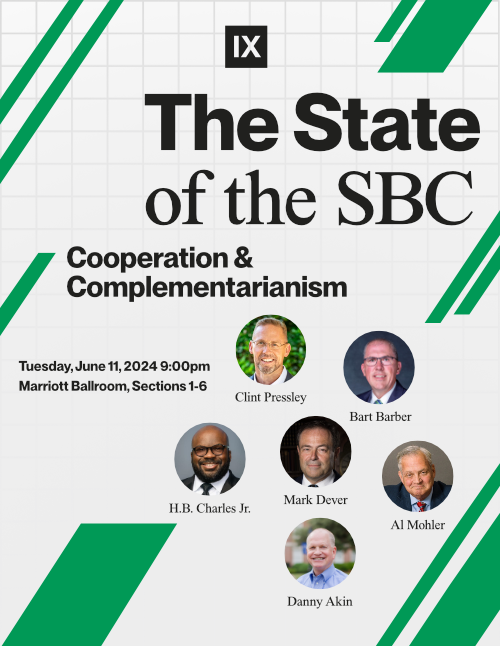Twelve Steps to Regain Meaningful Membership
Suppose that, for one reason or another, you find yourself as the pastor of a church that does not practice meaningful membership. But now you’ve become convinced from Scripture that membership should be taken seriously. Following 2 Corinthians 6:14–7:1, you believe that the church must work hard at making sure it doesn’t yoke itself together with unbelievers. And you now want to pastor the whole congregation to better understand their biblical responsibilities to one another.
What can you do to recover meaningful membership in your church? Here is a suggested 12-step recovery plan for pastors to regain meaningful church membership.
1) Regularly proclaim the Gospel in your preaching. Be certain to include clear statements of the nature of God, of human sin, of God’s provision in Christ, of His substitutionary death and bodily resurrection. Be clear in calling for repentance and faith. Even in the way you explain what repentance looks like, you can make it clear that people who don’t give themselves in loving commitment to each other have no reason to think that they have given themselves in loving commitment to God. Define what it means to be a Christian again and again in provocative ways that cause complacent evangelicals to obey Paul’s exhortation to “examine yourselves,” (2 Cor. 13:5).
2) Have and use a congregationally agreed upon Statement of Faith and Church Covenant. Congregations are best served by documents shorter than that Presbyterian elders must agree on, but longer than a mere profession of faith. With membership in the congregation comes responsibility. The statements of what the congregation together believes, and how together they will live are important. They are a clear ground of unity, a tool of teaching, and a fence from the worldly who would erase such distinctions, or the divisive who would narrow them.
3) Require attendance at membership classes before admitting someone into membership in a congregation. It is a loving thing to present carefully the expectations others will have of them, and what they, in turn, can expect from the congregation. This is an opportunity to teach carefully through the statement of faith and the church covenant before they would be asked to sign them. You can also explain membership, something of the history of Christianity, and of your denomination, and even of your own particular congregation. It’s a good time, too, to orient them to the practical nuts and bolts of how your own local church works.
4) Require an interview after they have been through the membership classes, but before they’ve been recommended to the congregation for membership. This interview can be the occasion for the actual signing of the two documents they’ve studied in the membership class. In the past, Christians have conducted such membership interviews by a committee of members, or deacons, or elders, or even in front of the entire congregation. It’s the practice of our own congregation to do this with an elder and one or two others present (usually staff or an intern). In this interview ask them to share the gospel with you, and to give you a detailed account of their own conversion, and their discipleship since then. Re-iterate the expectations the congregation has for them to be present at gatherings on the Lord’s Day, at the Lord’s Table and at Members’ meetings. Also remind them of their obligation to build relationships as they get to know others, and allow themselves to be known, to pray for the other members, and to give financially.
5) Stop baptizing and admitting children into formal local church membership. Here’s what a former Baptist pastor and professor of evangelism at Southwestern said a few decades ago now, as he noted the trend to younger and younger baptisms: “At a time when he is too young to choose his clothes for himself, at a time when he is too young to choose a life’s vocation, at a time when he is too young to serve on a church committee, at a time when he is really too young to vote intelligently on business matters in the church, at a time when he is not considered legally responsible by any agency in the community, there has been a tendency to feel that he is sufficiently responsible to make a life-binding, permanent-type decision concerning his relationship to Christ and his church. If we are unwilling to feel that the child is capable of making lesser decisions, how can we justify our confidence in the efficacy of this greater decision at this age?” The question is not whether a 5 or 10-year-old can savingly confess Christ. The question is one of the congregation’s ability to discern. The large number of nominal Christians and re-baptisms in Southern Baptist churches seems to answer the question clearly in the negative. We are not meant to be able to fully distinguish a child’s love and trust in God, from their love and trust in adults, especially their own parents. That grows up over time, as the distinct outlines of the young adult’s life comes into place as they feel the pull of the world, the flesh and the devil, and yet follow Christ. Baptists around the world know this; Baptists here in America used to. We can again.
6) Realize that admission into church membership is an act of the congregation. This is clearly implied in II Cor. 2:6. Whether that is done in the most direct manner (by a congregational vote) or in a less direct method by publicizing the names for a set period of time and asking for feedback, the congregation should be taught that it acts to admit someone into its membership, and that (apart from death) it acts to release someone from its membership.
7) Publish a membership directory in which the members of the church are represented by name, picture, physical address, email and work and home phone numbers. Publish it regularly so that it is accurate. Teach the members to update their information regularly. Cultivate using this directory as a prayer list for the pastors and members of the church. In our congregation, we ask members to try to pray through a page each day in their own personal prayer time.
8) Give active pastoral oversight to the members. Try to make sure that every member is in regular conversation with some elder or some mature Christian in the congregation. Take initiative in trying to know what’s going on in the members’ lives. Lunches, phone calls and emails, book recommendations, and conversations after church gatherings are obvious tools. The pastors can also make more structured efforts at member visitation.
9) Work to create a culture of discipleship in the church. Rather than basically relying on programs of small groups or shared interests, encourage members to deliberately give themselves in love to each other. Encourage them in their responsibilities to care for each other. Use the staff to facilitate relationships, with the goal that everyone in the congregation would have multiple natural relationships with others in the congregation in which they are being built up as Christians. Help them to understand that their welfare is the business of their brothers and sisters.
10) Limit some activities, events and areas of service to members. For example, there should be meeting at which only members attend. These could be on Sunday night or Saturday, but they would need to be separate from the public services to which all are welcome. A biblical practice of church membership requires discussions that are both church wide, but which are only of the church. (Matthew 18:17 seems to imply something like this.) Make sure that only members can hold offices in the church, lead in various kinds of service, take public roles that would seem to imply the congregation’s knowledge and consent. In our congregation, except for evangelistic small groups, we have small groups available for members only. As part of our congregation’s discipleship plan, we take responsibility for them, and so we need to be able to approve the leaders and settle any difficulties that occur. (Of course, our members are free themselves to arrange Bible studies with whomever they would like, from however many different churches. We as a staff simply do not take responsibility for training those leaders, and filling those groups. We don’t rely on them for our own congregation’s life.)
11) Only after membership is recovered, consider reviving the practice of corrective church discipline (including excommunication or exclusion). Too many pastors attempt to recover meaningful church membership by first recovering the practice of corrective church discipline, but this is normally a jarring transition in congregational life. One must first take steps to recover a positive, understanding and experience of membership, before one begins to exclude members for demonstrable unrepentant sins of non-attendance, adultery, etc.
12) Finally, we must recover something of the grandness of God’s plan. Pray for God’s blessings on other local evangelical congregations by name in your Sunday morning services. Remind the congregation of the story we’re involved in that is greater than our local congregation.
Pastors must again meditate on Heb.13:17 and consider the seriousness of the accounting to God we are to give for those to whom we have given assurance of their salvation. Continued membership in our congregation is giving such assurance. If there are no signs of a sinner being repentant and reconciled with God, we do not love them by simply adding their name to our church’s role, and counting them among our number. And remind yourself of the One who finally determines the meaning of church membership. I love this quotation of the Scottish pastor John Brown in a letter of paternal counsels to one of his pupils newly ordained over a small congregation: “I know the vanity of your heart, and that you will feel mortified that your congregation is very small, in comparison with those of your brethren around you; but assure yourself on the word of an old man, that when you come to give an account of them to the Lord Christ, at his judgment-seat, you will think you have had enough.”
Ultimately that is the meaning of church membership.
* * * * *
Editor’s note: This material has been adapted from Mark Dever’s chapter “Regaining Meaningful Church Membership” in Restoring Integrity in Baptist Churches, ed. Thomas White, Jason B. Duesing, and Malcomb B. Yarnell, III, pages 57-60.








